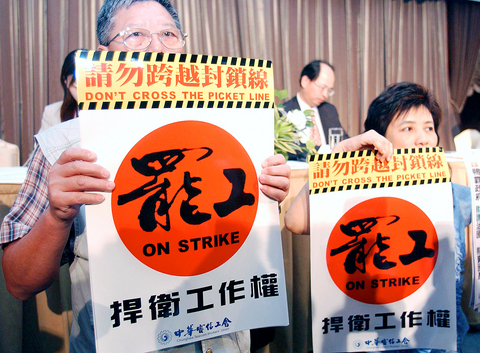In opposition to the government selling its shares in the state-controlled Chunghwa Telecom Co (
"We'll launch a long-term strike starting tomorrow [Tuesday] morning, which might last two or three days," Hung Hsiu-lung (洪秀龍), a core member of the Chunghwa Telecom Workers' Union (中華電信工會), said yesterday.
The union has been opposing the government's plan to privatize the telecommunications giant, worrying that their employee pension benefits will be sacrificed.

PHOTO: AFP
The Ministry of Transportation and Communications, the biggest shareholder in the company, plans to auction off a 3 percent stake to domestic investors today and another 14 percent stake through American Depositary Receipts (ADRs).
This will help reduce the ministry's stake in the company from the current 65 percent to around 48 percent, making Chunghwa Telecom a private entity.
The labor union said it was seeking an injunction from a US court against an additional 13.5 percent sale of the company's equity through ADRs.
"The contracted US attorneys-at-law is to file for an injunction by a US court tomorrow at the latest to freeze Chunghwa Telecom's ADR sale," which Chuang Ping-tang, secretary-general of the labor union, insisted is a violation of the law.
Although the labor union vowed to hold strikes on a larger scale than ever, company officials are unfazed and promised the public that services will continue as normal.
"We are confident that there will only be a small number of employees joining the strike or protesting in front of the company headquarters. Backup personnel will fill the vacant posts to offer services and protect consumers' rights," said company vice-president and spokesman Hank Wang (王漢朝).
Clashes between the union and management dominated and led to an abrupt halt of a meeting held yesterday in Taipei by the company to provide detailed information about the planned after-hours auction of its shares this afternoon.
Around ten union members held posters and signs voicing their opposition against the government's share sales in front of the podium while Wang was briefing scores of interested investors about the benefits of buying Chunghwa Telecom stocks.
"We oppose the heavy-handed manner with which the government wants to sell off national property cheaply, thereby enriching business conglomerates," read the posters, which were also distributed to members of the audience attending the meeting.
Despite the union's repeated efforts to stop the sales, Chunghwa Telecom chairman Hochen Tan (賀陳旦), president Lu Shyue-ching (呂學錦) and several high-level executives have already embarked on a road show in Hong Kong, Singapore, Japan and Europe to promote the company's ADR sales.
Meanwhile, Chunghwa Telecom vice-president Chang Feng-hsiung (
"I guarantee that Chunghwa Telecom will do whatever it can to prevent subscribers' rights from being compromised under any circumstances," he said.
Jonathan Liao (廖俊傑), an analyst with SinoPac Securities Corp (建華證券), said it is expected that the company can successfully be privatized this week, which will help pump nearly NT$100 billion (US$3.14 billion) into state coffers to help the government put a brake on its rising budget shortfall.
But because of the labor union's protest, the company's share price will lose momentum in the short term and do more harm than good, he said.
Chunghwa Telecom shares fell nearly three percent to close at NT$61.5 yesterday on the Taiwan Stock Exchange.

Intel Corp chief executive officer Lip-Bu Tan (陳立武) is expected to meet with Taiwanese suppliers next month in conjunction with the opening of the Computex Taipei trade show, supply chain sources said on Monday. The visit, the first for Tan to Taiwan since assuming his new post last month, would be aimed at enhancing Intel’s ties with suppliers in Taiwan as he attempts to help turn around the struggling US chipmaker, the sources said. Tan is to hold a banquet to celebrate Intel’s 40-year presence in Taiwan before Computex opens on May 20 and invite dozens of Taiwanese suppliers to exchange views

Application-specific integrated circuit designer Faraday Technology Corp (智原) yesterday said that although revenue this quarter would decline 30 percent from last quarter, it retained its full-year forecast of revenue growth of 100 percent. The company attributed the quarterly drop to a slowdown in customers’ production of chips using Faraday’s advanced packaging technology. The company is still confident about its revenue growth this year, given its strong “design-win” — or the projects it won to help customers design their chips, Faraday president Steve Wang (王國雍) told an online earnings conference. “The design-win this year is better than we expected. We believe we will win

Chizuko Kimura has become the first female sushi chef in the world to win a Michelin star, fulfilling a promise she made to her dying husband to continue his legacy. The 54-year-old Japanese chef regained the Michelin star her late husband, Shunei Kimura, won three years ago for their Sushi Shunei restaurant in Paris. For Shunei Kimura, the star was a dream come true. However, the joy was short-lived. He died from cancer just three months later in June 2022. He was 65. The following year, the restaurant in the heart of Montmartre lost its star rating. Chizuko Kimura insisted that the new star is still down

While China’s leaders use their economic and political might to fight US President Donald Trump’s trade war “to the end,” its army of social media soldiers are embarking on a more humorous campaign online. Trump’s tariff blitz has seen Washington and Beijing impose eye-watering duties on imports from the other, fanning a standoff between the economic superpowers that has sparked global recession fears and sent markets into a tailspin. Trump says his policy is a response to years of being “ripped off” by other countries and aims to bring manufacturing to the US, forcing companies to employ US workers. However, China’s online warriors